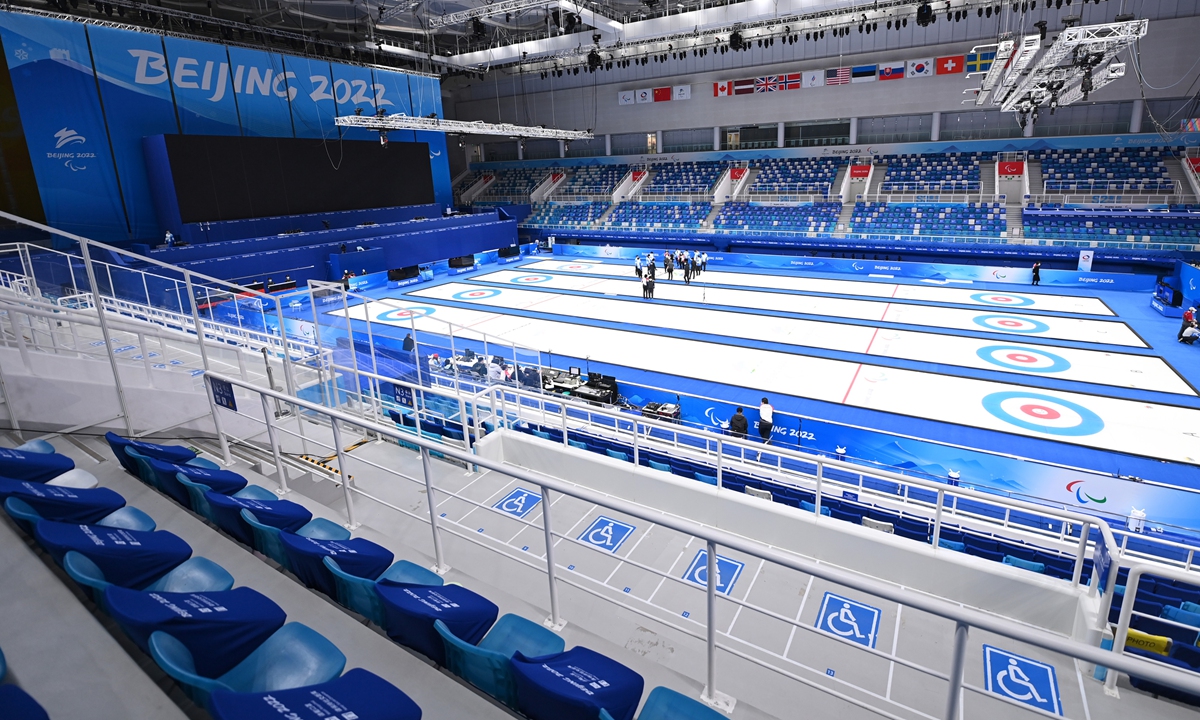 The National Aquatics Center has been upgraded to become barrier-free for the curling events at the Beijing 2022 Winter Paralympic Games. Photo: Xinhua
The National Aquatics Center has been upgraded to become barrier-free for the curling events at the Beijing 2022 Winter Paralympic Games. Photo: Xinhua
With the help of technologies, the Beijing 2022 Winter Paralympic Games has made every effort to create a barrier-free environment, provide athletes with convenient, fast, accurate and meticulous services as well as a comfortable living environment, demonstrating the warmth of China.
The National Aquatics Center, a venue once used for swimming and diving at the 2008 Beijing Olympics, was transformed into a curling venue to continue to serve the Winter Paralympics Games. For the smooth running of the Winter Paralympic Games, this venue underwent a systematic upgrade in barrier-free facilities.
During the upgrade, barrier-free roads, parking spaces, entrances and exits, elevators, ramps, toilets, changing rooms, and signage systems were reconstructed or newly built in the arena known as the "Ice Cube."
For the wheelchair curlers, the arena has also been designed with specific anti-epidemic measures, such as increasing the width of the temperature measuring door to ensure the passage of wheelchairs, and lowering the height of placement tables for the convenience of disabled athletes.
"The Ice Cube is the most accessible venue I have seen in the world," said Wang Jianxin, wheelchair curling gold medalist of the Pyeongchang Winter Paralympics.
Kate Caithness, President of the World Curling Federation, also said that the design of the barrier-free ramp and other facilities was very good and done in a considerate way. "This is the best curling arena I've ever seen at any Winter Olympics."
These facilities will not only be used to serve the Winter Paralympic Games, but will continue to facilitate the use of physically-challenged people after the games.
At the National Indoor Stadium, where the Paralympic ice hockey events are being held, all passenger elevators have been retrofitted for accessibility and there is not a single doorstep in the arena. From the athletes' locker room to the pitch, all passages are covered with simulated ice slabs and the slope of the ramp is lowered so that athletes can roll into the pitch from the locker room.
In the stadium, the best audience sections are reserved for physically-challenged spectators. A total of 36 accessible stands were newly constructed, and the stands protrude like balconies, scattered at the entrance of each arena, so that physically challenged viewers are closer to the pitch and they can enjoy a great viewing experience.
In the Winter Paralympic Village, where the athletes live, the needs of physically-challenged athletes are also fully protected. For example, all doors in the rooms are sliding doors with handles. The bathroom floor is non-slip and toilets and made with safety bars on both sides.
During the transition from the Winter Olympics to the Winter Paralympics, the supporting staff dismantled the feet of each bed and lowered their height by 30 centimeters, so that athletes can get into their beds more conveniently.
In their rooms, athletes can control the lamps, air conditioning and curtains through smartphone apps or the intelligent control panel.
High technologies including AI, 5G, digital money and cloud infrastructure are also playing important roles at the Paralympics.
For instance, during the Beijing 2022 Winter Paralympic Games, an AI sign language interpreter has been performing its duties. The interpreter is developed using a new offering of China's tech giant Baidu's AI Cloud's digital avatar platform XiLing, which aims to help break down communication barriers for the deaf and hard-of-hearing (DHH) community by boosting the accessibility of automated sign language translation.
The AI sign language platform is able to generate digital avatars for sign language translation and live interpretation within minutes, the Global Times learned from Baidu.
A special volunteer team of guide dogs trained through scientific researches will be present at the Beijing 2022 Winter Paralympic Games. The pack has undergone specialized training to provide services under complex situations and cold environments.
Raising awareness
Behind the Winter Paralympic athletes, there are professionals that work hard to help them pursue better performances with scientific ideas and techniques.
A pair of "piercing eyes" has been helping Paralympic ice hockey players by collecting their motion data in order to provide suggestions for tactics.
This edging system, namely the intelligent motion perception technology and assistant training system, is developed by Beijing Jiaotong University and implemented by Beijing IceBlade Technology Co., LTD.
It serves as an accurate trajectory system for high-speed skating and skiing in complex environments, and brings forward "suggestions" for daily training and competition in Paralympic ice hockey, alpine skiing, speed skating and other projects, Li Xuan, who is in charge of the Beijing IceBlade company, told the Global Times.
The system can undergo positioning monitoring for each athlete 100 times per second with an accuracy of 5 to 10 centimeters, which greatly helps athletes and coaches.
"It is the first time that we have used technology in winter sports," Li introduced, "Many excellent foreign coaches in China have also showed great interest in it. They've said they have never seen such a system used in winter sports before and would like to introduce it in Europe."
At Shanghai University of Sport (SUS), a comprehensive support team consisting of specialists in sports science, medicine, nutrition and psychology provides training and rehabilitation services for the alpine skiing, ski jumping, ice hockey and skeleton athletes of Team China.
Serving the athletes from 2018, the 30-member support team started by spending months researching each athlete's body condition, including their degree of physical disability, before making a personalized training program for them all, said team leader Wu Xueping, professor and executive director of Institute of Sports Sciences at SUS.
Compared with able-bodied people, Wu said her team focuses more on the improvement of body balance and muscle strength of athletes with disabilities. "For example, Para-snowboarding athletes - especially those who sit, not stand, on the board - their force application points, body movements during the process are different," Wu told the Global Times.
Many able-bodied athletes train at low-oxygen plateaus to build up muscle strength, while Wu's team offered the Para athletes local pressurization equipment to help them develop muscle strength through restricting the blood flow of certain body parts, such as lower limbs. "This is an innovative approach in China that brings conveniences to the daily training of Para athletes, particularly under the COVID-19 pandemic," Wu said.
The mental health of athletes is also what the team attaches great importance to, Wu noted. Unlike popular summer sports including track and field, Wu said many Para athletes of Team China had not dabbled in winter sports until in the last couple of years. "Occasionally, there were athletes who came to us and said they wanted to give up," Wu told the Global Times. "It's normal that they have fear in training and competition sometimes."
The team's psychologists regularly distribute mental questionnaires and conduct counseling for athletes, to help them boost their moods and conquer fears. "They deserve admiration," Wu said. "They overcome their mental fear and physical disabilities in the pursuit of professional success."
Researching the physical training and rehabilitation of people with disabilities since 2002, Wu and her students have been working for decades to help thousands of ordinary residents with disabilities in Shanghai apart from serving the Para athletes.
"I think that a big treasure that Summer and Winter Paralympics wants to bring to us is the raising of our awareness for caring for people with disabilities," Wu said. "They deserve more attention and better public sports services."




